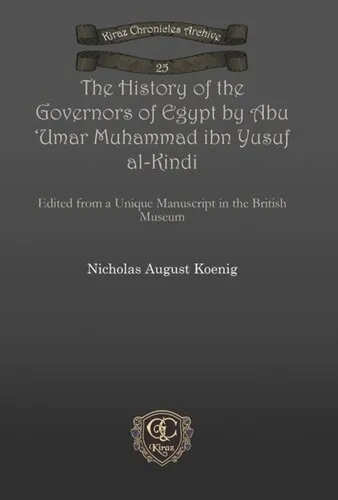The History of the Governors of Egypt by Abu 'Umar Muhammad ibn Yusuf al-Kindi: Edited from a Unique Manuscript in the British Museum
4.3
Reviews from our users

You Can Ask your questions from this book's AI after Login
Each download or ask from book AI costs 2 points. To earn more free points, please visit the Points Guide Page and complete some valuable actions.Related Refrences:
Introduction to "The History of the Governors of Egypt"
Detailed Summary of the Book
The book is a meticulous chronicle of the governors who ruled Egypt from the advent of Islamic governance until the era contemporary to al-Kindi himself. Structured as both a narrative and a repository of records, the manuscript offers detailed accounts of the socio-political landscape under various governors. It provides a chronological listing, accompanied by analysis and commentary on the governors' policies, military campaigns, and administrative reforms.
Al-Kindi, through his analytical prowess, captures the essence of governance challenges in medieval Egypt and the interplay of local and imperial politics. What makes this work stand out is its strategic perspective on the shifts in power dynamics and its examination of how these governors balanced local tribal alliances with the overarching interests of the caliphates they represented.
Key Takeaways
- Comprehensive record of Egypt’s administrative history under Islamic governance.
- Insightful analysis of power struggles between provincial governors and centralized caliphate authority.
- Understanding of socio-economic policies and their impacts on the region’s development.
- Exploration of the role of Egypt as a pivotal province in Islamic history.
Famous Quotes from the Book
Al-Kindi's work, while primarily historical, is rich with observations that resonate with universal themes of leadership and governance. Here are some poignant excerpts:
"The strength of a governor does not solely rest in his ability to wield power, but rather in his wisdom to wield it justly."
"In Egypt, the rivers of administration must flow with both knowledge and dedication, lest they become dry with tyranny."
Why This Book Matters
The significance of al-Kindi's work lies in its combination of scholarly depth and practical detail. It serves as both a historical document and a guide to the intricacies of governance during one of history's most formative periods. For researchers and students of Islamic history, the book provides rich empirical data and invaluable insights into the principles and practices that shaped one of the greatest civilizations.
In the broader context, understanding the governance of Egypt through al-Kindi's eyes allows contemporary readers to appreciate the enduring legacies of administrative leaders and their impact on modern governance structures. The meticulous preservation and editing of this unique manuscript from the British Museum highlights the ongoing importance of preserving historical texts that contribute to our understanding of global history.
Free Direct Download
You Can Download this book after Login
Accessing books through legal platforms and public libraries not only supports the rights of authors and publishers but also contributes to the sustainability of reading culture. Before downloading, please take a moment to consider these options.
Find this book on other platforms:
WorldCat helps you find books in libraries worldwide.
See ratings, reviews, and discussions on Goodreads.
Find and buy rare or used books on AbeBooks.
1477
بازدید4.3
امتیاز0
نظر98%
رضایتReviews:
4.3
Based on 0 users review
Questions & Answers
Ask questions about this book or help others by answering
No questions yet. Be the first to ask!















